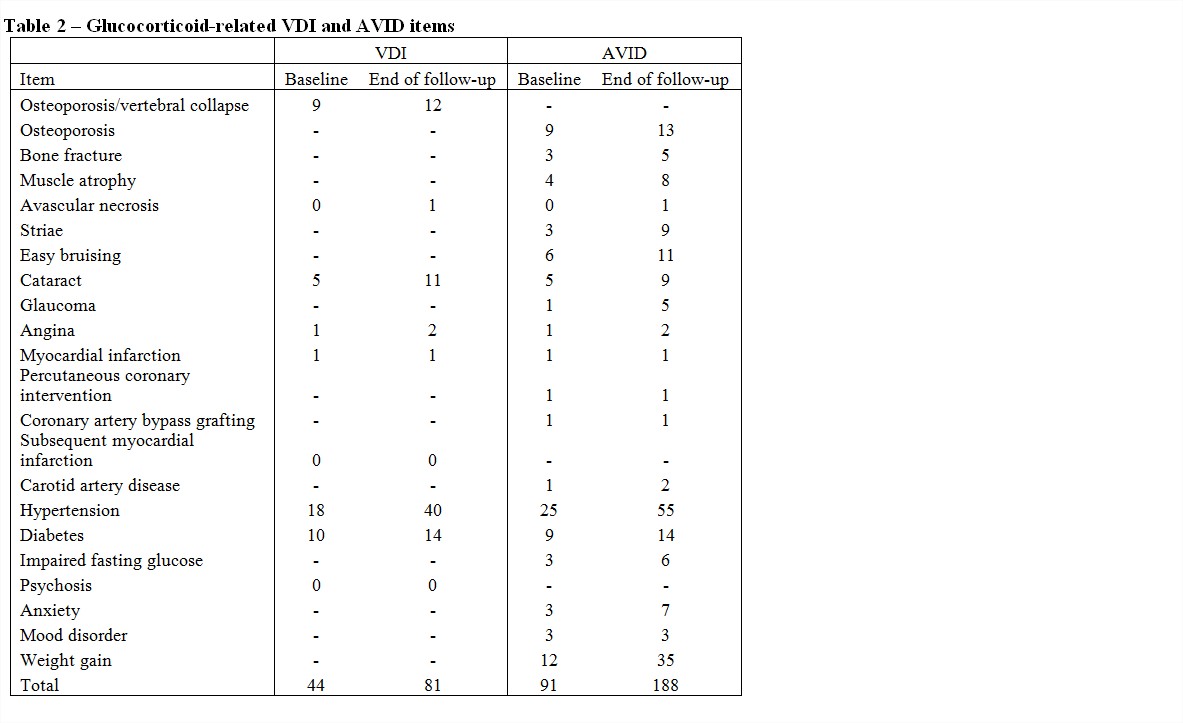Session Information
Date: Sunday, November 8, 2015
Title: Vasculitis Poster I
Session Type: ACR Poster Session A
Session Time: 9:00AM-11:00AM
Background/Purpose:
Damage related to active disease or its treatment is an
important outcome measure in ANCA-associated vasculitis (AAV). The Vasculitis
Damage Index (VDI), the principal damage measure in AAV, was not designed
specifically for AAV. The VDI may also underestimate toxicity from therapies
for vasculitis, particularly glucocorticoids (GC). The AAV Index of Damage
(AVID) was designed to be a more comprehensive tool for the assessment of
damage in AAV, both due to disease and its treatment. We compared the
performance of AVID to that of the VDI in the context of a large randomized,
double-blind, placebo-controlled trial.
Methods:
We analyzed the VDI and AVID in 197 patients enrolled in the
Rituximab in AAV (RAVE) trial. Disease damage was measured prospectively at
baseline, 6, 12, 18 months, and end of follow-up by both the VDI and AVID.
The VDI is composed of 11 categories (e.g., musculoskeletal,
pulmonary) and 64 individual damage items. The AVID has 12 categories and 112
items (Table 1). Twenty-five of the AVID items pertain to treatment-related
damage (20 related to GC toxicity), compared to only 13 in the VDI (9 related
to GC toxicity). Each item was counted as one point in the total score.
Results:
AVID captured 184 more damage-related items at baseline
compared with the VDI. During the course of the trial, AVID identified 358 new
items compared with only 201 identified by the VDI (Table 1). Renal and ear/nose/throat
categories accounted for the most damage in both instruments. 188 (27%) of the
new AVID items pertained to GC-associated damage as compared to 81 (18%) of the
VDI items (Table 2).
The sum of GC-related AVID items was greater among the patients
in the highest quartile of cumulative GC use (mean dose 9.2g) compared to the
lowest quartile (mean dose 3.7g) (51 versus 22, p<0.01). In contrast, there
was no significant difference in VDI scores between these two groups (24 versus
14, p=0.08). Changes in neither the AVID, nor the VDI scores correlated with baseline
disease severity, the number of relapses during follow-up, or changes in
quality-of-life as measured by the Short Form 36 Health Survey.
Conclusion:
In this prospective, head-to-head comparison of the AVID and
VDI, AVID captured substantially more items of damage caused by either active
AAV or its treatment. GC-related damage was captured more comprehensively by
AVID, which was able to differentiate between high and low GC users. The
inclusion of item weighting may improve the correlation of disease damage
scores with baseline disease severity and patient quality-of-life scores.
To cite this abstract in AMA style:
Miloslavsky E, Lu N, Unizony S, Choi HK, Merkel PA, Seo P, Spiera RF, Langford CA, Hoffman GS, Kallenberg C, St.Clair EW, Tchao N, Fervenza F, Monach PA, Specks U, Stone JH. The ANCA-Vasculitis Index of Damage (AVID): Performance of a New Damage Instrument [abstract]. Arthritis Rheumatol. 2015; 67 (suppl 10). https://acrabstracts.org/abstract/the-anca-vasculitis-index-of-damage-avid-performance-of-a-new-damage-instrument/. Accessed .« Back to 2015 ACR/ARHP Annual Meeting
ACR Meeting Abstracts - https://acrabstracts.org/abstract/the-anca-vasculitis-index-of-damage-avid-performance-of-a-new-damage-instrument/


